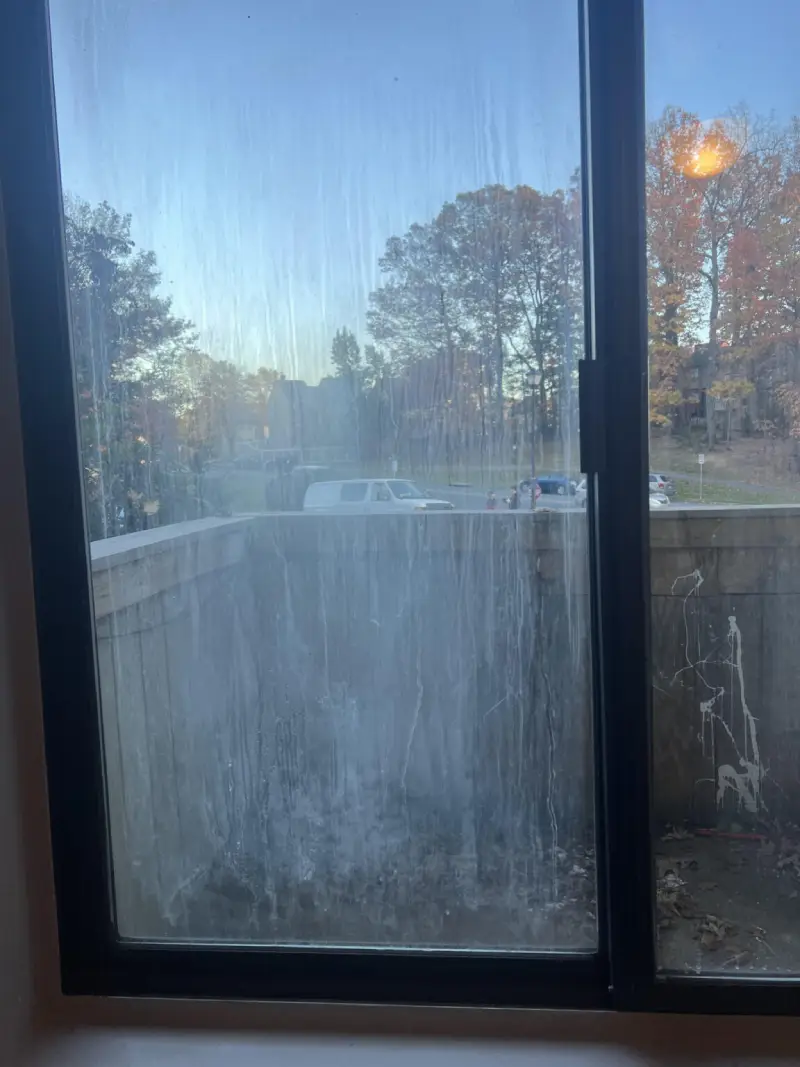Waking up to the beautiful morning sun, sipping a cup of coffee and glancing through the clear window… sounds like an ideal start to your day, doesn’t it? But, a common problem that households experience is window fogging – a phenomenon that can hinder this beautiful sight. This post will provide you with everything you need to know to win the battle against window fogging – the science behind it, its causes, prevention strategies, solutions, and maintenance tips.
Understanding Window Fogging
Before we step into understanding how to prevent windows from fogging up, let’s unravel the science behind this phenomenon.
The science behind fogging
Imagine this – You’ve just served yourself a cold glass of lemonade, and you notice droplets of water forming on the glass exterior. This is condensation in action, and it’s the exact science that causes window fogging. When warm, moist air comes into contact with a colder surface (like your windows), it releases some moisture which condenses and forms water droplets, appearing as ‘fog’ on your window.
Effects of temperature and humidity on window fogging
Remember, it’s not simply cold weather that leads to foggy windows. The magic number here is the “dew point” – the temperature at which air can no longer hold all of the water vapor mixed with it, and condensation occurs. Thus, fogging is a function of both temperature and humidity levels – either a warm humid day or a cold moist night can be the villains behind your foggy windows.
Impact of window fogging
While fogged windows might create a fun ‘canvas’ for your kids to draw on, they can be quite a nuisance. It affects visibility which can be especially problematic while driving or for your home security. It also hampers the overall aesthetic appeal of your home and can be an inconvenience during social gatherings or when we just want to enjoy a clear view.
Common Causes of Window Fogging
Let’s delve into some of the common causes of window fogging.
Indoor humidity and its relationship with window fogging
Activities like cooking, showers, or even human breathing increase the humidity levels indoors. And when this humid air meets the cold window surface, voila! Your windows fog up.
Cold outside, warm inside scenario
If it’s freezing outside and you’ve got the heater on inside, the significant temperature difference can create an environment conducive for window fogging.
Leaking or Broken Window Seal
Inadequate or broken window seals allow cool air to seep in and warm air to escape, thereby giving rise to different temperature zones and consequently, window fogging.
How to Prevent Window Fogging
Understanding the causes is great, but let’s talk solutions. Here’s how you can prevent this whole fogging drama.
Regulation of Indoor Humidity
Consider investing in a hygrometer to monitor indoor humidity levels and aim to keep it below 50%. You can achieve this by using exhaust fans in the kitchen, laundry rooms, and bathrooms – places where humidity is usually high.
Proper Ventilation
Effective ventilation helps combat excessive indoor moisture. Regularly opening windows even just a little bit can significantly reduce window fogging.
Role of Window Insulation
Properly insulated windows lessen the differences between indoor and outdoor temperatures, therefore reducing condensation. Look into double glazing or weatherstripping for your windows for better insulation.
Advanced Tips for Reducing Indoor Humidity
While basic ventilation and exhaust fans help, there are several advanced strategies to maintain optimal indoor humidity and keep your windows fog-free. Smart home devices, like humidity sensors and thermostats, can monitor moisture levels in real-time and adjust your HVAC system automatically. This ensures that humidity never reaches the point where condensation forms. Additionally, certain houseplants, such as Boston ferns, peace lilies, and English ivy, naturally absorb moisture from the air. Placing these in areas prone to fogging, like kitchens or bathrooms, can provide both aesthetic appeal and practical benefits. For a simple DIY solution, leave cabinet doors open after cooking or washing dishes to allow steam to escape, or use moisture-absorbing products like silica gel packs in closets and smaller rooms.
Effective Window Insulation Techniques
Proper insulation is key to preventing temperature differences that lead to fogging. Double or triple-glazed windows significantly reduce condensation by creating a thermal barrier between the cold exterior and warm interior. If replacing windows is not an option, smaller adjustments like weatherstripping and caulking can seal tiny gaps around frames to prevent cold air from seeping in. Thermal curtains or blinds are another cost-effective method. They not only enhance privacy but also help maintain an even indoor temperature, reducing the likelihood of moisture condensing on the glass. Homeowners can combine these strategies for a noticeable reduction in window fogging.
Seasonal Considerations
Window fogging tends to fluctuate with the seasons. During winter, cold outdoor temperatures combined with heated indoor air create a prime environment for condensation. Adjusting your thermostat slightly and using a humidifier sparingly can help balance the moisture in your home. In summer, high humidity levels from rain or heat can also cause windows to fog, particularly if air conditioning cools the air too rapidly. Using ceiling fans and ventilating rooms after showers or cooking can help maintain ideal humidity. Understanding how each season impacts condensation allows homeowners to implement targeted strategies year-round.
Spotting Early Warning Signs
Detecting early signs of window fogging can prevent long-term issues. Look for cracks or discoloration along window seals, persistent condensation even after proper ventilation, or the appearance of mold and mildew near windows. A simple troubleshooting checklist can help identify which windows are at risk and whether the issue is caused by humidity, insulation, or faulty seals. Acting promptly at this stage often saves money and effort compared to full window replacements later.
Long-Term Maintenance Strategies
Maintaining fog-free windows requires consistency. Regularly clean your windows with vinegar or alcohol-based solutions to remove residues that attract moisture. Periodically check window seals and caulking for wear and tear, especially before and after winter. Keeping a log of recurring fogging issues can help professionals diagnose persistent problems more efficiently. If fogging continues despite these efforts, consulting a window repair specialist may be necessary. They can inspect for broken seals, recommend anti-fog coatings, or advise on glass replacement.
The Link Between Window Fogging and Indoor Comfort
Preventing window fogging isn’t just about clear views—it directly impacts your home’s comfort and health. Excess moisture can encourage mold growth, affecting indoor air quality. Proper insulation and humidity control also improve energy efficiency, reducing heating and cooling costs. Most importantly, fog-free windows enhance your living space’s aesthetic appeal, making your home feel brighter and more inviting.
Professional Solutions to Window Fogging
If you’re struggling with persistent window fogging, it might be time to look into professional solutions.
Dehumidifiers
Dehumidifiers can be a fantastic solution for homes/offices in regions with high humidity levels. They help extract excess moisture from the air, maintaining optimal indoor humidity levels.
Special window coatings
Window coatings, like anti-fog sprays, work by creating a thin film on your window surface that reduces the surface tension, allowing condensation to spread into a thin transparent layer instead of forming droplets!
Window glass replacement
In severe or recurring cases of window fogging, professional support may suggest window glass replacement – especially if the issue is due to a faulty window seal. You can call Advanced Window & Glass Repair, LLC to get a free phone estimate and let us replace your foggy glass in windows or doors.
Maintenance tips to keep windows fog-free
Winning the war against foggy windows isn’t a one-time task. Regular maintenance plays a key role.
Regular Cleaning
Clean windows are generally less prone to fogging. Regularly cleaning them with a vinegar or alcohol solution can help maintain those clear views we all love.
Regular Ventilation
Making a habit of airing out your house every day, especially after activities that generate a lot of steam (like cooking or hot showers), can help maintain the right humidity levels.
Periodic checks and intervention
Perform regular checks for signs of window fogging and take necessary actions to limit it promptly. This might mean checking window seals, ensuring your heating & cooling systems are functioning efficiently, and keeping an eye on those humidity levels.
Winning the Battle Against Window Fogging
In summary, window fogging can be a nuisance but understanding its causes and effective preventive measures can help you tackle this issue head-on. Remember, the keys to clear windows are monitoring your indoor humidity, ensuring proper ventilation, investing in quality window insulation, prompt testing, and maintenance.


















